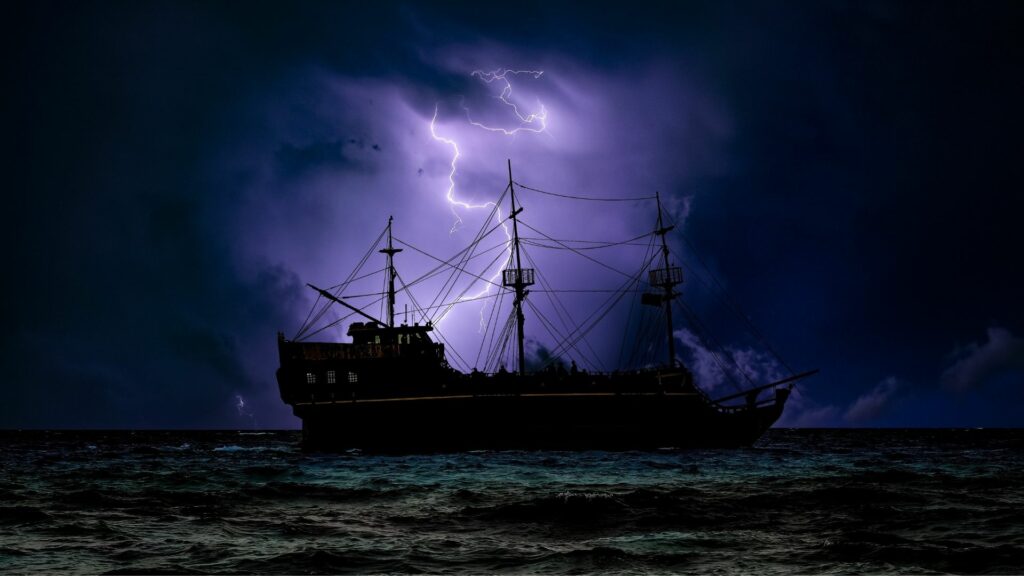The sea is a world of its own—unpredictable, untamed, and full of its own language. If you’ve ever watched Pirates of the Caribbean, you’ve heard the gruff voice of Captain Hector Barbossa bellowing orders like:
“All hands! Ply to windward! Get cracking, ye bloomin’ cockroaches!”
But what exactly is he saying?
- “All hands” means everyone on deck needs to help.
- “Ply to windward” is a command to sail against the wind.
- “Get cracking” means to hurry up!
What’s fascinating is that we still use some of these expressions today—often without realizing their origins. From “shipshape” to “feeling blue,” our everyday language is full of phrases that come straight from the sea. In this article, we’ll set sail through history and uncover the nautical roots of the expressions we use on land.
Captain Gary Daggett, whom I like to call the Great Captain of the Great Lakes, has been an incredible source of knowledge and inspiration. His deep understanding of maritime history and sailing traditions helped shape this article, and I’m grateful for the insights he has shared. This journey through nautical expressions wouldn’t be the same without his guidance—thank you, Captain Daggett!

Many phrases we use daily have their roots in sailing and maritime traditions. These expressions, shaped by centuries of seafaring life, carry the hidden history of sailors who braved the unpredictable sea. Uncovering their origins adds a fascinating layer to our everyday language. So, batten down the hatches— we’re about to set sail!
Feeling Blue
Ever woken up, checked your inbox, and thought, “Ugh, I’m feeling blue today”? Well, sailors knew that feeling all too well—except their bad days involved losing their captain at sea. To mourn, they’d paint the ship’s hull blue and raise blue flags when returning to port. So next time you’re “feeling blue,” just be glad you’re not the one steering a ship home with bad news!
Learning the Ropes
Starting a new job? Picking up a new skill? You might say you’re “learning the ropes”—but if you were an 18th-century sailor, you’d really be learning them. As always, mastering the countless ropes and rigging on a sailing ship was—and still is—essential. A clueless sailor could tangle the lines or, worse, send the ship in the wrong direction. So, when you’re learning the ropes, be thankful you’re not hoisting sails in a storm!
High and Dry
Ever been stranded with no help? Maybe a friend bailed on plans, leaving you high and dry. That’s nothing compared to what sailors faced. A ship that ran aground would be literally high (out of the water) and dry (stuck on land). And unlike your canceled dinner plans, this was a real disaster—the ship wasn’t going anywhere!
Batten Down the Hatches
When bad weather is on the way, people say to ‘batten down the hatches‘—but unless you’re on a ship, you’re probably not securing anything. The phrase comes from the practice of reinforcing a ship’s hatches with wooden strips called ‘battens‘ to keep water out during storms. Sailors would fasten canvas covers over the hatches with these battens, sealing them tightly to withstand rough seas—a reminder to prepare for tough conditions ahead.
By and Large
We use “by and large” to mean “generally speaking”—but to sailors, this phrase was about sailing in any direction, no matter the wind.
- “By” meant sailing into the wind.
- “Large” meant sailing with the wind at your back.
A ship that could handle both was well-suited for any voyage—just like how today, someone who’s good “by and large” is pretty adaptable!
Three Sheets to the Wind
Ever seen someone wobbling out of a bar like they’re trying to walk through a hurricane? That’s exactly what sailors thought too. “Sheets” aren’t bed covers—they’re ropes that control the sails. If three sheets were loose, the sails would flap wildly, making the ship unsteady—just like a drunken sailor!
Show Your True Colors
If you’ve ever accused someone of showing their true colors, you can thank sneaky 18th-century warships for that one. Back then, ships often flew false flags to trick their enemies. But before attacking, they were required to hoist their actual national flag—revealing their true identity. So, the next time someone’s not as nice as they first seemed, just imagine them as a pirate flying a fake flag.
Taken Aback
Ever had news that stopped you in your tracks? That’s exactly what happened to sailors when their ship was “taken aback.” If the wind suddenly changed direction, the sails could snap backward, stopping the ship or even pushing it in reverse. It’s when a sail being abruptly pushed flat against the mast when the wind suddenly shifts. This unexpected force could momentarily stop a ship’s movement, leaving it unable to steer. So, when something shocks you into silence, you’re basically a ship caught in unexpected winds.
Cut and Run
Ever had to ditch a situation fast? Maybe an awkward conversation or a bad date? You might say you cut and ran. Sailors used this phrase literally—if a ship needed to escape danger, they’d cut the anchor rope instead of taking time to haul it up. That way, they could sail away immediately—because sometimes, speed was more important than keeping your anchor!
In the Doldrums
Ever felt unmotivated and stuck? Congratulations, you now understand the biggest nightmare for old-time sailors. The Doldrums is a windless region near the equator. If a ship got stuck there, it could sit still for weeks—no wind, no movement, just waiting. So, the next time you’re stuck in a rut, just be glad you don’t have to sit under a scorching sun, waiting for the wind to return.
Feeling groggy
Woke up feeling sluggish? You’re “groggy”—and you have sailors to thank for that! Back in the day, British sailors were given a watered-down rum ration called “grog.” Drink too much, and you’d stumble across the deck, just like someone who didn’t get enough sleep.
I’ll be with you to the bitter end
Loyalty until the very last moment—that’s the “bitter end.” But on a ship, the bitter end isn’t just dramatic; it’s literal. It refers to the very last section of an anchor rope, which is fastened to a post called a bitt (The end of the anchor line secured to a sturdy post on the deck is also called a bitt). Once you reach it, there’s no more rope left—just like sticking with something to its final stretch.
That’s a telltale sign
Ever notice how sailors always seem to know which way the wind is blowing? That’s thanks to “telltales”—small strips of fabric or yarn attached to sails. They reveal wind direction and whether a ship is sailing efficiently. Today, a “telltale sign” still points us in the right direction—whether it’s a shifting wind or a sneaky lie.
They passed that with flying colors
Acing a test? Winning big? You passed with “flying colors.” But in the Age of Sail, this phrase wasn’t about grades—it was about victory. When a ship returned triumphant, it would proudly fly its flags, or “colors,” high and bright for all to see. No sneaking into port quietly after a win!
I just need a little bit to tide me over
Grabbing a snack to hold you over till dinner? You’re using an old sailor’s trick. Ships relied on tides to help push them along. If the tide wasn’t strong enough, they’d have to wait—or find just enough movement to “tide over” until better conditions arrived.

Between the devil and the deep blue sea
Stuck between two bad choices? So were old-time sailors when they had to caulk the “devil”—a difficult-to-reach seam running along a wooden ship’s hull. If you slipped, you were going straight into the deep blue sea. Not much of a choice, right?
That is how far as the crow flies
Need the shortest route? Ask a crow—sailors did! Ships carried crows in cages, and when land was out of sight, they’d release a bird and watch where it flew. Since crows naturally head straight for land, their flight path gave the most direct route—no winding roads or zigzagging currents needed.
Starting over with a clean slate
Making a fresh start? Sailors did, too—literally! Ship officers used slates to record duties, and at the end of a shift, they’d wipe them clean for the next crew. No baggage, no mistakes—just a brand-new slate, ready for the next adventure.
Toe the line
Time to fall in line—just like sailors on deck. On navy ships, crew members had to stand at attention with their toes lined up perfectly along the deck planks. No slouching, no drifting—just strict discipline, straight as a mast.
Footloose
Living without restrictions? You’re as “footloose” as an unsecured sail. The bottom edge of a sail is called the “foot,” and if it wasn’t tied down properly, it would flap freely in the wind. That kind of freedom sounds great—unless you’re the one trying to steer the ship!
Pipe down
Trying to get some peace and quiet? On a ship, that meant one thing—the boatswain’s whistle. A short, sharp “pipe down” was the signal for sailors to stop talking and turn in for the night. No arguments, no excuses—just silence on deck.
Above board
Pirates had a sneaky habit of hiding weapons below deck, while honest merchants kept everything “above board” for all to see. Today, if someone’s dealings are transparent and honest, they’re playing it “above board”—no pirate tricks involved!
Bail out
When water started flooding a ship, sailors had to bail it out fast or risk sinking. Now, whether you’re escaping a bad situation or saving a struggling business, “bailing out” still means getting out of trouble—hopefully without a bucket in hand.
Chock-full
When cargo was packed tightly on a ship, sailors used wooden wedges called chocks to hold everything in place. If a ship was “chock-full,” it meant there wasn’t room for even one more barrel of rum! Today, whether it’s your fridge or your schedule, if it’s “chock-full,” it’s packed to the brim.
Give a wide berth
Ships anchored at a safe distance from each other to avoid collisions—giving each other a “wide berth.” Now, whether it’s a bad driver on the road or an awkward person at a party, giving a wide berth is still a smart move.
Keel over
When a ship tips over and capsizes, it “keels over.” These days, you don’t need to be at sea to keel over—whether from exhaustion, shock, or laughing too hard, this phrase still means going down fast!
Let the cat out of the bag
No, this isn’t about an actual cat. The “cat” here is the cat-o’-nine-tails, a whip used for discipline on ships. If it was “let out of the bag,” punishment was coming! Thankfully, today it just means spilling a secret—no whips involved.
Over a barrel
A sailor being punished was sometimes tied over a barrel, leaving them completely helpless. Now, if you’re in a tough spot with no way out—like facing a boss who wants that overdue report—you’re definitely “over a barrel.”
Run a tight ship
A good captain didn’t tolerate slackers. A well-disciplined crew kept everything clean, orderly, and efficient. Today, whether it’s a business, a household, or a classroom, if someone “runs a tight ship,” you know things are under control.
Shipshape
A well-run ship was always neat and in order—no tangled ropes or messy decks. Today, whether you’re organizing your desk or cleaning your house, if it’s “shipshape,” it’s in perfect order.
The cut of your jib
A ship’s jib (a small triangular sail) helped identify it from a distance—friend or foe? Now, when people say they like or dislike “the cut of your jib,” they’re just talking about your style, not your sailing abilities.
Walk the plank
A pirate’s favorite way to get rid of unwanted guests? Make them “walk the plank” straight into the sea! Now, whether you’re being forced out of a job or just feeling pressured, the phrase still carries that ominous sense of no turning back.
When my ship comes in
Merchants who sent ships on long voyages hoped for a big payday when their vessel finally returned loaded with goods. Now, whether you’re waiting for a paycheck, a lottery win, or just some good luck, you’re hoping for “your ship to come in.”
Turning a blind eye
Ignoring something on purpose? You’re following in Admiral Nelson’s footsteps—literally. During a battle, Nelson, who was blind in one eye, was signaled to retreat. He lifted a telescope to his blind eye and declared, “I see no signal!” before charging ahead. The result? Victory—and a phrase we still use today.

Sailing has shaped not just history, but the very words we use every day. So, whether you’re high and dry or going full sail ahead, remember—you’re speaking like a sailor! What other nautical phrases do you use daily? Share them in the comments. Happy Sailing!


Thanks so much for enlarging my vocabulary in terms of sea and ships relationships. It is been thrilling to sail into details of famous captain’ s order.
You’re very welcome! I’m glad you enjoyed exploring the vocabulary of the sea and ships. There’s always something fascinating to learn about maritime history. Happy sailing on your voyage of discovery!